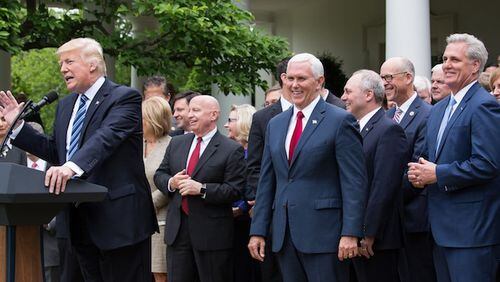Paul Ryan was once seen as the intellectual leader of the GOP. Ted Cruz was its conservative purist. Mitch McConnell was the party's brilliant strategist, and Rand Paul, its inconvenient but consistent libertarian, pushing to broaden Republican appeal.
But as Labor Day of the president's first year nears, party officials and veteran operatives concede that the GOP belongs to Donald Trump more than anyone else — and he is reshaping it in ways that will have dramatic implications for the party for a generation.
"Right now, it is his party," said Peter Wehner, who has served in the last three Republican presidential administrations.
"That's a political tragedy to me," he said. "There will be an enormous cost. Ultimately, the Republican Party has got to reclaim its identity apart from Trump. But right now, it's his party and we can cry if we want to."
The vast majority of Republican voters are distinctly dry-eyed. Despite historically low approval ratings at this point in the presidency, Trump's approval among Republican voters is close to 80 percent. While that's down from earlier in his presidency, it's an unquestionably strong number given the self-inflicted wounds and controversies this president has suffered.
Perhaps most critically, Trump polls much better with Republicans than the GOP-led Congress does — the congressional approval rating among Republicans is only 16 percent, according to a Gallup survey earlier this month.
And that basic truth has kindled among Republicans in Washington a fear of alienating Trump's voters, giving the president an extraordinary level of control over internal dissent, even as he shocks and offends GOP officials over everything from Charlottesville to Russia and apparent nuclear threats against North Korea.
"He got a lot of flak for saying he could kill someone on Fifth Avenue. It's kind of true. He can do anything and it's OK," marveled one GOP strategist in attendance at the summer meeting of the Republican National Committee here in Nashville, speaking of Trump's grip on the base.
"You're seeing it even with Charlottesville. After two days, his people are still there, they hate Congress more than him. It's kind of like, what is it going to take for these guys?"
At the meeting of the Republican National Committee, the official party apparatus closely tied to the White House, there is virtually no appetite for anything other than a full embrace of the president.
In conversations with RNC officials from across the country, gathered here at a sprawling resort last week, the vast majority of them expressed positive views of Trump, pointing to his help in fundraising for the party, his work on rolling back regulations and his appointment of Neil Gorsuch to the Supreme Court. Two RNC members were even overheard in a heated hallway argument over just how strongly one had initially supported Trump.
The right answer in that conversation, clearly, was: from the beginning.
Eric Trump, the president's son, was greeted warmly at the private RNC dinner Thursday night, where behind closed doors he ticked through all of the times his father had been underestimated during the campaign, and touted the RNC's strong fundraising as a sign of his father's popularity, and of the party's, according to Pennsylvania GOP Chairman Val DiGiorgio and others in the room.
The RNC meeting featured a parade of Trump loyalists, from Brad Parscale, Trump's 2016 digital director who is now involved in the president's political efforts; to Trump TV surrogate-turned-RNC spokeswoman Kayleigh McEnany; and Michael Glassner, who is spearheading the president's re-election campaign.
"The party is generally very supportive of his statements and actions regarding North Korea, his recent speech on Afghanistan, great progress he's made already on regulatory reform," said Bill Palatucci, the Republican national committeeman from New Jersey. "Those are campaign promises kept that a lot of Republicans are really happy with."
Certainly, there are plenty of Republicans — some inside the RNC, and many more outside of it — who have been deeply bothered by what they see as Trump's often-divisive tone, a far cry from the pushes for inclusiveness that lawmakers like Ryan, Paul and Marco Rubio have been making for years.
In a recent op-ed, former Missouri Sen. John Danforth, a Republican, warned that "our party has been corrupted by this hateful man," calling Trump "the most divisive president in our history" and urging the party to break with the president.
Trump's equivocating response to the neo-Nazis and white supremacists rallying in Charlottesville prompted genuine disgust among some Republicans — and also stoked fears that efforts to broaden the party's appeal to more diverse constituencies were destroyed in that moment. Trump's approach to that incident drew the most significant Republican backlash he has faced in his administration, and strategists predict there is only more to come.
"Even if he's the president, this party is not defined by the words or inaction of one man," insisted Clarence Mingo, a candidate for Ohio state treasurer who is considered a rising star, and was the state's only black delegate to the 2012 Republican National Convention.
"The president is not leading the nation on this issue of race relations, and in the absence of leadership, conservative Republicans have a responsibility to make sure the nation understands what the values of our party are, and what it means to be an American in 2017," Mingo said.
At the RNC, too, there were a handful of people who were — quietly — troubled by Trump's response to Charlottesville.
The committee passed a resolution that strongly condemned the "violence and racist beliefs of white supremacists demonstrating in Charlottesville." Palatucci, who sponsored it, told the AP he thought Trump "got it wrong" on the day that the president, in a news conference, said there were "very fine people on both sides." And RNC Chair Ronna Romney McDaniel earned a standing ovation when she said rejection of hate should be nonpartisan, though she characterized Trump's response to Charlottesville as "speaking out strongly against any group that uses hate or violence."
Others here had qualms about Trump and his attacks on fellow Republicans. But they would only share those concerns privately for fear of alienating the White House.
"We understand the president has disagreements with his own party, but I think a lot of us would like the president to remember Ronald Reagan's axiom: Someone who votes with you 70 percent of the time is your friend, not your enemy," one longtime RNC member told McClatchy.
Instead, Trump is prone to tearing into members of his own party, including Sen. Jeff Flake, one of the GOP's most vulnerable senators running in 2018, as well as McConnell and Ryan. And that was just in recent days.
But for members of Congress, Trump's lock on the party base means that their fate is tied to his, said Scott Jennings, a former Bush administration official and veteran Kentucky-based strategist who is generally supportive of the president.
"They will rise and fall together," he said. "If the president is succeeding, it probably means the Congress has passed legislation that largely matches what he wants. If Congress is succeeding, it means Donald Trump is signing into law things they have passed. If you judge success by, are we passing bills, writing legislation that is responsive to campaign promises and enacting them into law, they rise and fall together."
Alex Conant, a Republican strategist who has served as a top adviser to Rubio, said he expects members of Congress to feel more comfortable breaking with Trump on more issues as they return to Washington from August recess.
"Trump is pretty much out of political capital at this point," Conant said. "After seven months in office, he has very little to show for his legislative agenda, his poll numbers are at historic lows and we've seen his standing amongst Republican voters start to fall. The idea that he's going to come back and find a unified Congress willing to follow his lead is laughable at this stage."
But, Conant allowed, "It's always the Republican primary voters' party."






